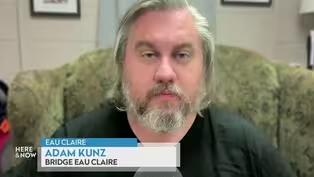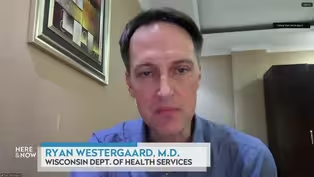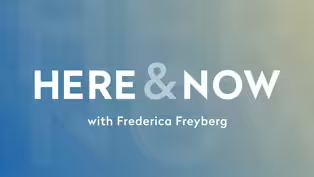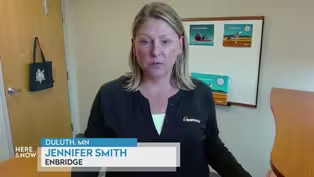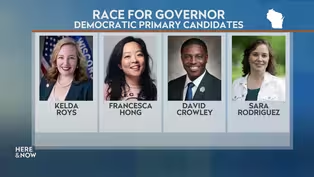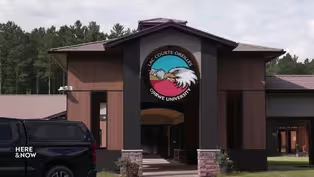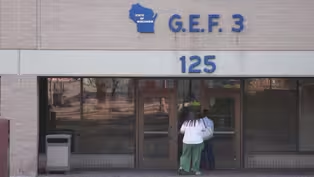Here and Now
Chairman Robert Blanchard on Challenging Line 5 Rerouting
Clip: Season 2400 Episode 2411 | 6m 2sVideo has Closed Captions
Robert Blanchard on challenges to permits for a reroute of the Enbridge Line 5 pipeline.
Bad River Band of Lake Superior Chippewa Chairman Robert Blanchard discusses challenges to state permits allowing a reroute of the Enbridge Line 5 pipeline around tribal lands in northern Wisconsin.
Problems playing video? | Closed Captioning Feedback
Problems playing video? | Closed Captioning Feedback
Here and Now is a local public television program presented by PBS Wisconsin
Here and Now
Chairman Robert Blanchard on Challenging Line 5 Rerouting
Clip: Season 2400 Episode 2411 | 6m 2sVideo has Closed Captions
Bad River Band of Lake Superior Chippewa Chairman Robert Blanchard discusses challenges to state permits allowing a reroute of the Enbridge Line 5 pipeline around tribal lands in northern Wisconsin.
Problems playing video? | Closed Captioning Feedback
How to Watch Here and Now
Here and Now is available to stream on pbs.org and the free PBS App, available on iPhone, Apple TV, Android TV, Android smartphones, Amazon Fire TV, Amazon Fire Tablet, Roku, Samsung Smart TV, and Vizio.
Providing Support for PBS.org
Learn Moreabout PBS online sponsorshipthe risk of illness, hospitalization and death for people who choose to get them.
controversy over the oil and gas pipeline through northern Wisconsin went before the public this week during the third of four contested case hearings across the state.
In Ashland, the bad River Band of Lake Superior Chippewa presented witnesses in their challenge of the permits the Wisconsin DNR granted to Canadian Enbridge Energy Inc.
for a 41 mile reroute of the pipeline.
Operational since 1953.
Line five, as it's known, carries 23 million gallons a day from Superior to Ontario.
The tribe had sued to remove the pipeline from its reservation lands after easements expired.
And in 2020, Enbridge proposed rerouting part of the line around tribal lands.
Late last year, the DNR granted permits for pipeline construction that impacts wetlands and waterways, as well as granting permits to maintain erosion control and water quality in the midst of construction.
That includes blasting, bedrock and drilling.
The tribe and environmental groups challenged those permits, resulting in the court ordered public hearings.
Bad River tribal chairman, Robert Blanchard, was the first to take the stand.
And chairman, thanks very much for being here.
>> Thank you for having me.
>> So what did you most want the judge to know about the impacts of line five and its reroute around the bad River reservation, but through nearby wetlands and wetlands, what did you most want the judge to know about those impacts?
>> So reroute is going within the ceded territories of of of the the band.
And impact is going to be over 100 acres of wetlands, which, you know, will get disturbed.
30 some acres of that will not be usable again through horizontal direct drilling, blasting, which is going to, you know, a lot of it's going to impact our our water resources.
>> Now, I know, I know, the tribe wanted the pipeline removed from your land.
Why isn't rerouting it around the reservation proper enough?
>> Well, I will do is shift the risk upstream, exposing more of the environment to be put at at at risk than than what is now.
But, you know, like I said before, we have ceded territories hunting and fishing and gathering of of medicines and other other stuff.
So I mean that that's just going it's just moving the problem upstream.
You know, we're we'll be downstream from that.
And if something were to happen, you know, it's really impact us as people and our way of life.
>> Circling back to something you spoke to a moment ago during your testimony, you spoke about the wild rice harvest.
Why is that?
And hunting and fishing rights you hold.
So key to your community?
>> Well, we've been harvesting wild rice on in the Sokaogon Streu's for over 100 years.
You know, my grandparents brought us harvested down there, and they they made rice camps down there.
And, you know, so that that's near and dear to my heart and a lot of other people also.
But.
It identifies us as, as people, you know, that that we were brought here for a reason.
And, and one of the reasons is that to go where the food grows on the water, and that was the wild rice, and that is quite dear to us.
And as far as other things, hunting, fishing and gathering, you know, there's a lot of people today that that use that resource to provide and put food on the table for their families.
So it's very important to us.
>> Why are the waters and the land so important to the protection of those rights?
>> Well, we also feel that, you know, everything out there is sacred.
You know, we we we we use that that those resources.
And when we go and harvest and we go hunting or fishing, we take only what we need to do for our families.
So and we also believe that, you know, that everything out there has a spirit.
Every living thing out there has a spirit, you know?
And that's what we're protecting is the spirit of that medicine, the spirit of that wild rice and the spirit of those waters and lands to be able for our future generations, to be able to enjoy that.
>> For its part, Enbridge states that they have learned what they do today impacts the next seven generations.
And it has that.
It has a responsibility to care for the land.
What's your response to that statement from the CEO of Enbridge?
>> Well, I don't think Enbridge really understands, you know, the they look at it a lot different than we do.
You know.
They're they're there for for different reasons.
And we're there to to protect the land, truly protect the land and the resources.
>> Your Band River Band is fighting hard over this.
What will you do if the line five project is allowed to proceed in this way?
>> Well, that's a that's the big question.
We are still trying to come up with some some answers, and we're just going to keep moving forward and keep fighting.
>> We will be watching.
Adam Kunz on College Students and Civil Political Discussion
Video has Closed Captions
Clip: S2400 Ep2411 | 6m 23s | Adam Kunz on efforts to bring together college students to discuss polarizing issues. (6m 23s)
Evers Order Requires COVID Vaccine Coverage in Wisconsin
Video has Closed Captions
Clip: S2400 Ep2411 | 1m 7s | Ryan Westergaard on an order requiring insurance to cover access to COVID-19 vaccine. (1m 7s)
Here & Now opening for September 19, 2025
Video has Closed Captions
Clip: S2400 Ep2411 | 1m 13s | The introduction to the September 19, 2025 episode of Here & Now. (1m 13s)
Jennifer Smith on Enbridge's Proposal For Rerouting Line 5
Video has Closed Captions
Clip: S2400 Ep2411 | 4m 55s | Jennifer Smith on Enbridge's plans to reroute its Line 5 pipeline around tribal lands. (4m 55s)
More Democrats Enter Wisconsin's 2026 Gubernatorial Primary
Video has Closed Captions
Clip: S2400 Ep2411 | 26s | State Sen. Kelda Roys and state Rep. Francesca Hong enter the 2026 governor's race. (26s)
Tribal Colleges To Get One-Time $108 Million Federal Boost
Video has Closed Captions
Clip: S2400 Ep2411 | 38s | The Department of Education announced tribal colleges will get a one-time funding boost. (38s)
The Politics of Remote Work and Wisconsin State Employees
Video has Closed Captions
Clip: S2400 Ep2411 | 5m 15s | A bill seeks to halt most remote work practices for state employees in Wisconsin. (5m 15s)
Providing Support for PBS.org
Learn Moreabout PBS online sponsorship
- News and Public Affairs

Top journalists deliver compelling original analysis of the hour's headlines.

- News and Public Affairs

FRONTLINE is investigative journalism that questions, explains and changes our world.












Support for PBS provided by:
Here and Now is a local public television program presented by PBS Wisconsin
